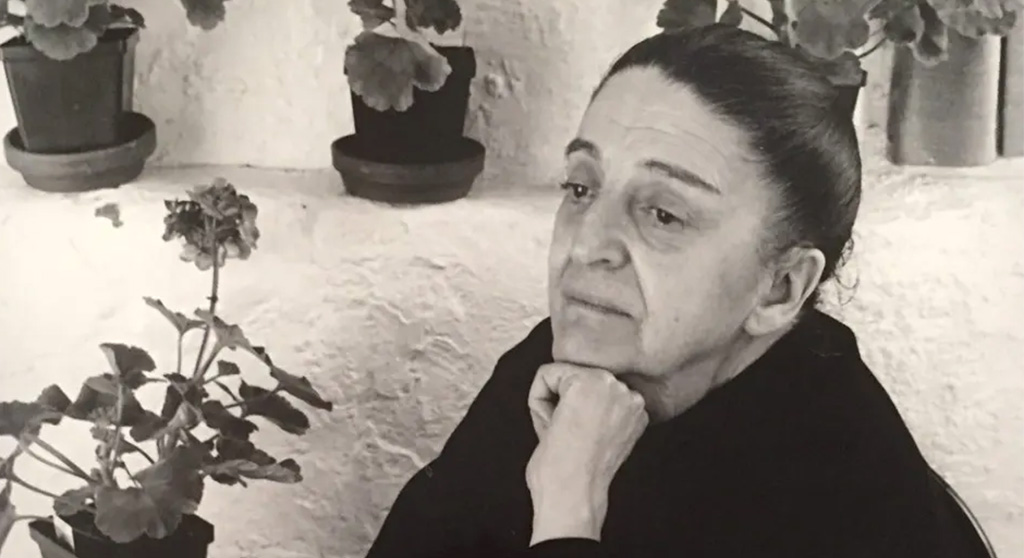Eliodora ‘Josefina’ Yanguas Perez opened Harvard Square’s first European-style café

Eliodora “Josefina” Yanguas Perez. (Photo: Carol Fippin)
Today there are at least 20 cafés in Cambridge where patrons can enjoy espresso drinks. In 1959, there was exactly one. That was the year Spanish immigrant Josefina Yanguas opened Café Pamplona on Bow Street.
Eliodora “Josefina” Yanguas Perez was born in Pamplona, Spain, on Nov. 29, 1916. Her father worked as a tailor. In her early years, she endured many hardships, starting when she was 10 and her mother died. She helped raise her three younger siblings, filling this role with such loving kindness that her brother, Gabriel, said fondly that she had been more of a mother than a sister to him.
During the bloody Spanish Civil War, which began when Yanguas was 20, many of her close friends were killed. The war culminated in repressive dictator Francisco Franco taking power. Dispirited and with few opportunities for the future, Yanguas made a meager living as a seamstress. She yearned to begin a life elsewhere. Finally, in 1948, family friends helped her secure employment with Amado Alonso, a Harvard linguistics professor from the Navarra region in Spain. Yanguas traveled by cargo ship to Boston, carrying with her one small suitcase. Her responsibilities for the Alonso family included child care and general household help. Alonso’s children adored Yanguas and remained in touch with her for many years.

Perez with the Alonso family. She was their au pair. (Photo courtesy of Carol Fippin)
In the United States, Yanguas missed relaxing in cafés with friends as she had in Spain, and longed to create a European-style café in Cambridge. In 1958, with the help of friends, she made her dream come true. For $23,000, she bought a wooden, three-story building at 12 Bow St., Harvard Square. Yanguas renovated the top floor to use as her home, complete with kitchen cabinets and counters more suited to her height (less than 5 feet). Her café was on the basement level. She imported what may have been the first commercially used espresso machine in Cambridge. In 1959, Café Pamplona, named for her beloved hometown, opened for business. Customers happily imbibed the then novel espresso, cappuccino and mocha brews Yanguas prepared from freshly ground beans.
Soon after the café opened, a Harvard Crimson reporter remarked that the café was unusual for reasons in addition to serving espresso: Rather than dark and smoke-filled, Café Pamplona was airy (despite being belowground) and uncluttered. Yanguas had whitewashed the stucco walls and covered the floor in black and white tiles, in the Spanish style. To maintain customers’ privacy and keep noise levels low, Yanguas provided ample space between tables. Another unique feature (for the time) was outdoor seating, where, in pleasant weather, customers could sip coffee and enjoy pastries, and later soups, salads and sandwiches.

Perez with her brother soon after entering the United States in 1949. (Photo courtesy of Carol Fippin)
The goal was to provide a salon of sorts where artists, writers, researchers, intellectuals and students could exchange ideas. She noted that this concept was a new one for many in her adopted country. “Americans are not used to ‘waste time.’ But you don’t waste time in a café, you talk.” To ensure that nothing would compete with conversation or interfere with writers’ concentration, Yanguas never allowed music in her café.

A portrait of Perez by Patsy Hoffman courtesy of Carol Fippin.
In 1963, Yanguas expanded her business to include a restaurant a few blocks from Café Pamplona, off John F. Kennedy Street. She named it Iruña, the Basque word for Pamplona. After five years, she sold the enterprise to an employee, Florencio Velis. He retained the original name and continued to run the popular eatery with his family for more than 40 years.
The president of the Navarra region in Spain, Miguel Sanz, and mayor of Pamplona, Yolanda Barcina, honored Yanguas in 2006 for bringing the culture of Pamplona to Cambridge. Cambridge mayor, Kenneth Reeves, participated in a small outdoor ceremony, presenting her a key to the city.

Perez at Café Pamplona with her signature geraniums.(Photo courtesy of Carol Fippin)That same year, Yanguas sold the business to Nina Hovagimian. Retaining ownership of the building, she continued to live upstairs until her death from cancer on Aug. 1, 2007, at the age of 90. She is buried in Mount Auburn Cemetery.
The Covid lockdown forced Hovagimian into bankruptcy. Café Pamplona closed permanently in spring 2020. Twelve Bow Street is owned by a family trust and, thanks to Yanguas’s efforts, is protected as a Cambridge Designated Landmark.
![]()
About History Cambridge
 History Cambridge started in 1905 as the Cambridge Historical Society. Today we have a new name, a new look and a whole new mission.
History Cambridge started in 1905 as the Cambridge Historical Society. Today we have a new name, a new look and a whole new mission.
We engage with our city to explore how the past influences the present to shape a better future. We strive to be the most relevant and responsive historical voice in Cambridge. We do that by recognizing that every person in our city knows something about Cambridge’s history, and their knowledge matters. We support people in sharing history with each other – and weaving their knowledge together – by offering them the floor, the mic, the platform. We shed light where historical perspectives are needed. We listen to our community. We live by the ideal that history belongs to everyone.
Our theme for 2022 is “How Does Cambridge Work?” Make history with us at historycambridge.org.
Gretchen G. Adams is a volunteer at History Cambridge



